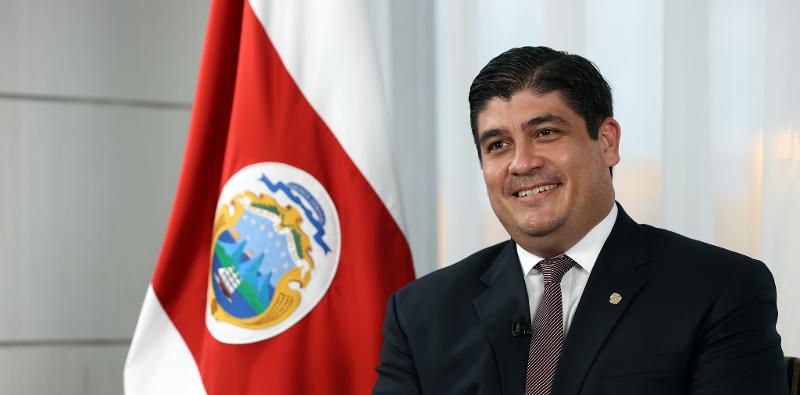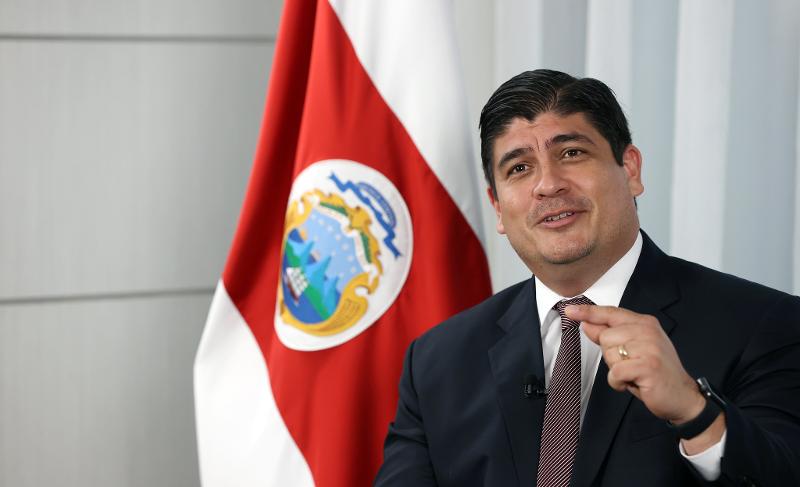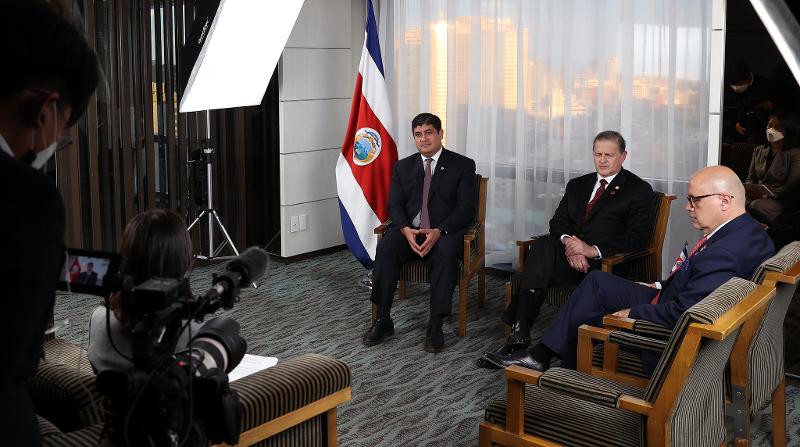
Costa Rican President Carlos Alvarado Quesada on Nov. 23 said the biggest achievement in relations between Korea and Costa Rica is the upgrade of bilateral ties to an "action-oriented comprehensive partnership." His interview with Korea.net was held at the Millennium Hilton Seoul located in the city’s Jung-gu District.
By Yoon Sojung, Elias Molina and Kim Hayeon
Photos = Jeon Han
Video = Jeon Han, Kim Sunjoo and Lee Jun Young
Seoul | Nov. 23, 2021
Costa Rican President Carlos Alvarado Quesada on Nov. 23 said he was "amazed" by the quality of the Oscar-winning movie "Parasite" and Netflix smash hit series "Squid Game," expressing his country's admiration for Korean TV dramas and cinema.
In an interview with Korea.net at the Millennium Hilton Seoul in the city’s Jung-gu District, he said he hopes for joint production of films and dramas between both countries.
"Can you imagine a film made both in Korea and Costa Rica, with the landscapes of both countries?," he said. "That would be something unique. We do admire the film and television industry of this country."
President Alvarado on Nov. 21 arrived on a four-day state visit to Korea at the invitation of President Moon Jae-in ahead of the 60th anniversary of bilateral relations next year.
On his impression of Korea, he said he did not feel cold thanks to the warm reception and hospitality of people he met.
Turning to bilateral relations, he called Korea a country that achieved full development and transformed through hard work and discipline, adding that Seoul's policy direction is "very much in line" with Costa Rica's as both countries pursue the same values such as human rights, democracy and peace.
Based on their comprehensive cooperation partnership, the president said the two countries upgraded bilateral relations to the level of an "action-oriented comprehensive partnership," calling this the biggest achievement in 60 years of ties.
The Korean New Deal, composed of the Green and Digital New Deals, possess the same direction as Costa Rica's 2050 decarbonization plan, he said, adding, "Since the two countries seek the same direction, if we work together, we can produce a win-win effect."
On the Korean Peninsula peace process, the president said the efforts of President Moon and his administration led to the restoration of peace on the peninsula, dubbing it a "remarkable development."
In culture, President Alvarado said the Korean beer he tried on this trip was "very good." Earlier last month, he expressed his fondness for kimchi and soju (traditional liquor) to President Moon when they met at the 26th United Nations Climate Change Conference (COP26) in Glasgow, the U.K.
President Alvarado said his parents love watching Korean dramas and films, with his mother even asking him to buy Korean night cream and his father requesting green bottles (soju) that they saw on K-dramas.
He said his parents hailed the display of strong respect for the elderly in Korean content, adding, "They like how Korean series show a culture of respect and hard work."
The president said he hopes that many Koreans visit Costa Rica, adding, "Once they get there, some of them will not want to come back."
Born in 1980, President Alvarado is his country’s youngest leader in history, with his election in 2018 at age 38 drawing global attention. Limited to a single four-year term, he will conclude his term in May.
This interview was conducted at the request of the Costa Rican Embassy in Seoul on the occasion of President Alvarado’s state visit to Korea. This is Korea.net’s first exclusive interview with a foreign head of state since the site’s launch on Jan. 1, 2000.

Costa Rican President Carlos Alvarado Quesada on Nov. 23 said in an interview with Korea.net that the Korean New Deal, composed of the Green and Digital New Deals, have a lot in common with the National Decarbonization Plan of Costa Rica. He said both countries can achieve greater development if they work together.
The following are the excerpts from the interview.
- Welcome to Korea. You have much to celebrate this year such as the bicentennial anniversary of your independence and entry into the OECD. What is your impression of Korea on this state visit?
Though the weather was cold, the people were warm. They have received us in a very warm way, so we did not feel cold. We are happy to be OECD members with Korea so that we can work together in that forum with the same values. Also, having the bicentennial anniversary of our independence and OECD entry in the same year is a great gift, making the visit more meaningful.
- Korea and Costa Rica next year will mark the 60th anniversary of diplomatic relations. What do you think has been the biggest achievement in bilateral ties so far?
Korea has shown in past decades how countries through hard work and discipline can not only grow but also improve quality of life for its citizens through innovation, economic growth, and values such as democracy and human rights and peace. I believe the biggest achievement from this state visit is that President Moon and myself agreed to upgrade the level of the bilateral partnership to an action-oriented comprehensive partnership. Also through the upgraded partnership, we can work together in specific areas such as technology and innovation. Thanks to the upgraded cooperation with Costa Rica, Korea will be also able to strengthen its influence in the Central American and Caribbean regions. We also welcome both countries' partnership in digital transition for economic recovery after COVID-19, bio industry and green cooperation thanks to the latest state visit.
- You have expressed support for the Korean New Deal. Why is Costa Rica interested in this initiative?
The Korean New Deal, composed of the Green and Digital New Deals, are very aligned with our decarbonization plan 2050. Both plans focus on sustainability and also create more jobs and growth. This means we can work together to make things happen. For example, Costa Rica hopes to work with Korea in many areas such as technology, forest restoration and renewable energy.
- The Costa Rican government is pushing a bill to permanently ban fossil fuel exploration and extraction. What are the reasons behind this strong push and have any difficulties occurred?
The Costa Rican government seeks to abolish the use of fossil fuels through law. This is unnegotiable because it is a matter of ethics and future growth. The use of fossil fuels will lead to depletion of natural resources and may eventually lose our planet in future generations. For the next generation, the use of fossil fuels should be banned permanently. This is the way for us, society and the world to gain benefits. Indeed, there has been resistance, but we are on the right side of history and the world should also march ahead in this direction.
- Costa Rica has earned global attention as the first country to require vaccination against COVID-19 for children ages 5 and older. How does your nation, a global leader in vaccination, consider Korea's overall quarantine and vaccination? And what is the direction of bilateral cooperation in responding to the pandemic?
Since the beginning of the pandemic, Costa Rica has been working closely at the diplomatic level with pharmaceutical companies such as AstraZeneca and Pfizer even before vaccination was approved. More than 90% of the population shares the importance and have in-depth understanding of the vaccines. Korea has been the primary country to promote cooperation in the health sector. Our government wants to express gratitude for cooperation with Seoul in COVID-19 response from the beginning of the outbreak.
- You said you love kimchi and soju. Which Korean singer or TV drama you like? And have you seen "Squid Game?"
During my stay in Korea, I tried Korean beer. It was really good. The same goes for when it comes to kimchi and soju. I want to say that through online platforms, many Costa Ricans are watching various Korean TV shows. To be more specific, my parents also watched many Korean dramas and films. When I told my parents about my visit to Korea, my mother asked me to buy her one of those nice night creams that she sees on Korean television. My father said he would like to have those nice green bottles (soju). Both of them praised how people show respect to the elderly in Korean shows. They also speak highly of (the Korean) culture of respect and hard work. My parents are also very fond of romantic Korean dramas as well. From my side, I've seen the award-winning movie "Parasite" and "Squid Game." The quality of production is amazing. In Costa Rica, we recently signed a new law to foster national productions. And we would love to partner with Korea. Can you imagine a film made both in Korea and Costa Rica, with the landscapes of both countries? That would be something unique for the world to watch. This is what we need to cooperate on. And yes, we do admire the film and television industry of this country.
- How does Costa Rica view the Korean government's process for denuclearizing and achieving peace on the Korean Peninsula?
Costa Rica is a peaceful country with no armed forces. Many people ask how is this possible. Our country achieved peace with neighboring counties in democratic ways. We are also a country that accepted democracy earliest among Central American countries. Instead of spending budget on military, we invest in education, health and social development. Likewise, as a peacekeeping nation, we do support Korea's peacekeeping process. Imagine Korea back in 1953 before the Korean War. Back then, no one would believe today's development could be possible. Korea, however, made it possible. Thanks to the years of efforts of President Moon and his administration, Korea can gain back peace. This is such a remarkable development.
- You have six months until your term ends. What goals do you want to accomplish before leaving office?
Protecting the environment and responding to climate change are among my government's biggest political goals. During my time in office, I would like to make efforts to protect the environment not only in Costa Rica but also in other nations, especially through the Global Ocean Alliance's High Ambition Coalition and 30 by 30 Goals. The goals aim to preserve 30% of land and another 30% of ocean by 2030. In 2019, only five countries participated. Now 70 nations are participating and many other countries expressed their willingness to participate in the United Nations Climate Change Conference (COP26) in Glasgow, the U.K. We wish that the world can join the initiative of protecting the planet and climate. We also wish for more Koreans to visit Costa Rica. When Koreans visit Costa Rica, some might not want to return.

Costa Rican President Carlos Alvarado Quesada on Nov. 23 holds an interview with Korea.net at the Millennium Hilton Seoul in the city's Jung-gu District. From left are President Alvarado, Costa Rican Ambassador to Korea Alejandro Rodriguez Zamora and Costa Rican Foreign Minister Rodolfo Solano Quiros.